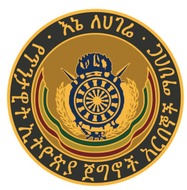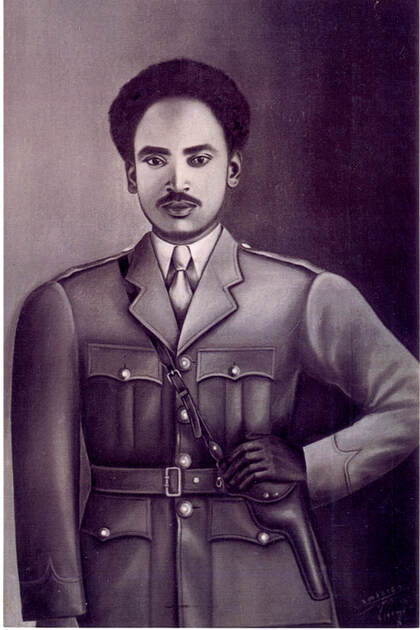Afework, as a man of the ordinary people, did not take him long to convince the residents of the area to be vigilant and wait for the up coming incursion of the enemy. His mission was so convincing that he had assembled a force to be reckoned with. Much to his disappointment he did not have enough arms, to arm his followers. The motto of defense was use what ever is at your disposal including swords and machetes since there is nothing Hollier than that of defending the territorial integrity and the God given sovereignty. The group of people who stood by the Grazmach was small but all determined to die for the cause.
Initially Afework was assigned to govern JIGJIGA and when it was feared that the Italians are using Somalia as a stepping stone for their incursion, he was transferred to Korahe. At a meeting of Ethio-Italian administrators and officers to resolve border issues of misunderstanding in the border city of Wolwal, the Italians took the liberty of formatting confrontation whereby the leader of the Ethiopian delegation namely Fitawrari Alemahehu Goshu and few others of his group were killed. The Italians after having provoked the scrimmage and killed the Ethiopia officials demanded compensation for the damages caused. When Ethiopia refused to be considered the belligerent, the Italians then started beating the war drum. It was after this incident that the Emperor assigned Afework to Korahe, a province vulnerable to Italian aggression. Afework in Korahe with the few of his followers built themselves a bunker to accommodate about 1500 of them. The shelter was only used whenever the Italian planes attacked in Korahe. During engagement Afework showed that he was not only an administrator but a born worrier. He had only one Oerlikon artillery to his name to chase the Italian planes. It was only he who could operate the anti aircraft machine. When the enemy planes flew over his head, it was only him exposed in the open to chase away the planes. An English journalist named S.L. Steer, who witnessed the war in Korahe, said that when the enemy plane attacked, Afework will go out of the bunker and chase the planes. Another witness, namely G.L. Frusci, disclosed in his book that in spite of the fact that the border patrols are small in number they were determined to fight to the last. Even if the bunker was not sufficiently ventilated it was habitable and highly protective. Grazmach Afework although assigned to administer the area proved himself to be a front line worrier. He showed his courage and commitment to defend his country as a true son of Ethiopia. Because of the intensity of his fire the Fascist force had all along suspected that the Grazmach had about sixty or so Oerlikon at his disposal. But in reality he had only one Oerlikon and four types of machine guns. The rest of the guns used by the soldiers were outdated. At one time the Fascist force launched an attack on Grazmach Afework’s garrison with six battalion of troops, 150 vehicles, 9 tanks and 20 iron clad cars. In order to face these challenges of enormous Fascist force Afework demanded that additional force be sent to him. Upon his request , the Ethiopin government sent him an enforcement force of only 600 soldiers much less than what is needed to contain a great number of enemy troops. To sum up, what the Grazmach has requested and received was not sufficient to repel the big and sufficiently armed group of the enemy. On October 23/1928 (eth.cal.) the Italians deployed about 20 light fighting planes to Korahe where the Grazmach was stationed. The planes were dropping hundreds of bombs on him and his troops. But Afework with his one OERLOIKON artillery gun sent them to where they came from within a 30 minute engagement as Mr. Steer put it in his book. In the course of the war Afework goes around his troops and tried to boast their morale by telling them that through their struggle Ethiopia will remain free from being the subjects of King Emmanuel of Italy. He was telling them that it was better to die on the field than see Ethiopia colonized. He used to tell them that they have lived there under one roof, eat the same food and when and if the time comes and there was a need for us to die that we will all die here together. His agitation was so strong that the troops resort to war cry songs. After the first day of bombardment, the Fascist force came back the next day, October 24/1928, with a larger contingent of planes and bombed the village indiscriminately by which time the only anti aircraft machine that Afework was using was insufficient to repel the invaders. Afework, the only man with the only one Oerlikon could not chase away the planes. He became vulnerable to the Italian planes and was wounded severely. In the meantime, the Italian force composed of Italian infantry accompanied by tanks, the Arab troops, the Somali troops and the traitors( the bandas) marched on to Korahe to capture the capital city of the province. In spite of the sever wound he encountered he was adamant about not giving up the fight. On October 25/1928 the day after he was wounded, Afework’s condition got worst and was not strong enough to fire his gun. The day his gun was silent gave news to his unconscious state of affair. Later in the day Afework lost a great deal of blood and was found face down on his gun signaling his death. The silence of his gun revealed to the people at large that their hero was dead. When he died he was only 30 years old. The death of the Grazmach in the battle field was informed to HIM Haile Selassie I . Within 14 day of his death the emperor awarded to the Grazmach the title of Dejazmach, posthumously. He is one of few persons given a posthumous award. Tradition has it that the young worrier is addressed as “ Afework Wolde Semaut, Dejazmach”. The title comes right after his name and not before as all cases. Ethiopia is blessed having such individuals who willingly engage the enemy against all odds. Ethiopia salutes Afework and his like who are willing to sacrifice their lives for the love of their beloved country. Soon after HIM Haile Selassie I, inaugurated a statue for the gallant worrier on his cemetery at Ogaden. A school and a hospital was also named after him. Ambassador Alemayehu Abebe Shenkut
0 Comments
|
AuthorWrite something about yourself. No need to be fancy, just an overview. Archives
February 2022
Categories |


 RSS Feed
RSS Feed